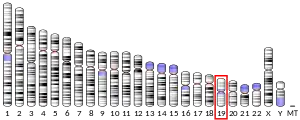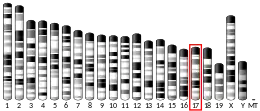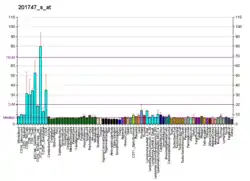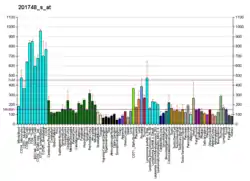SAFB
Scaffold attachment factor B, also known as SAFB, is a gene with homologs that have been studied in humans and mice.[5]
Function
This gene encodes a DNA-binding protein that has specificity for scaffold or matrix attachment region DNA elements (S/MAR DNA). This protein is thought to be involved in attaching the base of chromatin loops to the nuclear matrix but there are conflicting views as to whether this protein is a component of chromatin, the nuclear matrix, or both. Scaffold attachment factors are a subset of nuclear matrix proteins (NMP) with enriched binding to AT-rich S/MAR sequences. The SAF-B protein is thought to serve as a molecular base to assemble a 'transcriptosome complex' in the vicinity of actively transcribed genes. It is involved in the regulation of the heat shock protein 27 transcription and also can act as an estrogen receptor corepressor. This gene is a candidate gene for breast tumorigenesis.[5]
Interactions
SAFB has been shown to interact with:
References
- GRCh38: Ensembl release 89: ENSG00000160633 - Ensembl, May 2017
- GRCm38: Ensembl release 89: ENSMUSG00000071054 - Ensembl, May 2017
- "Human PubMed Reference:". National Center for Biotechnology Information, U.S. National Library of Medicine.
- "Mouse PubMed Reference:". National Center for Biotechnology Information, U.S. National Library of Medicine.
- "Entrez Gene: SAFB scaffold attachment factor B".
- Townson SM, Kang K, Lee AV, Oesterreich S (June 2004). "Structure-function analysis of the estrogen receptor alpha corepressor scaffold attachment factor-B1: identification of a potent transcriptional repression domain". J. Biol. Chem. 279 (25): 26074–81. doi:10.1074/jbc.M313726200. PMID 15066997.
- Oesterreich S, Zhang Q, Hopp T, Fuqua SA, Michaelis M, Zhao HH, Davie JR, Osborne CK, Lee AV (March 2000). "Tamoxifen-bound estrogen receptor (ER) strongly interacts with the nuclear matrix protein HET/SAF-B, a novel inhibitor of ER-mediated transactivation". Mol. Endocrinol. 14 (3): 369–81. doi:10.1210/mend.14.3.0432. PMID 10707955.
- Arao Y, Kuriyama R, Kayama F, Kato S (August 2000). "A nuclear matrix-associated factor, SAF-B, interacts with specific isoforms of AUF1/hnRNP D". Arch. Biochem. Biophys. 380 (2): 228–36. doi:10.1006/abbi.2000.1938. PMID 10933876.
- Townson SM, Dobrzycka KM, Lee AV, Air M, Deng W, Kang K, Jiang S, Kioka N, Michaelis K, Oesterreich S (May 2003). "SAFB2, a new scaffold attachment factor homolog and estrogen receptor corepressor". J. Biol. Chem. 278 (22): 20059–68. doi:10.1074/jbc.M212988200. PMID 12660241.
Further reading
- Oesterreich S (2004). "Scaffold attachment factors SAFB1 and SAFB2: Innocent bystanders or critical players in breast tumorigenesis?". J. Cell. Biochem. 90 (4): 653–61. doi:10.1002/jcb.10685. PMID 14587024. S2CID 39178501.
- Romig H, Fackelmayer FO, Renz A, Ramsperger U, Richter A (1992). "Characterization of SAF-A, a novel nuclear DNA binding protein from HeLa cells with high affinity for nuclear matrix/scaffold attachment DNA elements". EMBO J. 11 (9): 3431–40. doi:10.1002/j.1460-2075.1992.tb05422.x. PMC 556878. PMID 1324173.
- Renz A, Fackelmayer FO (1996). "Purification and molecular cloning of the scaffold attachment factor B (SAF-B), a novel human nuclear protein that specifically binds to S/MAR-DNA". Nucleic Acids Res. 24 (5): 843–9. doi:10.1093/nar/24.5.843. PMC 145707. PMID 8600450.
- Oesterreich S, Lee AV, Sullivan TM, Samuel SK, Davie JR, Fuqua SA (1997). "Novel nuclear matrix protein HET binds to and influences activity of the HSP27 promoter in human breast cancer cells". J. Cell. Biochem. 67 (2): 275–86. doi:10.1002/(SICI)1097-4644(19971101)67:2<275::AID-JCB13>3.0.CO;2-E. PMID 9328833. S2CID 29247141.
- DuPont BR, Garcia DK, Sullivan TM, Naylor SL, Oesterreich S (1998). "Assignment of SAFB encoding Hsp27 ERE-TATA binding protein (HET)/scaffold attachment factor B (SAF-B) to human chromosome 19 band p13". Cytogenet. Cell Genet. 79 (3–4): 284–5. doi:10.1159/000134744. PMID 9605873.
- Nayler O, Strätling W, Bourquin JP, Stagljar I, Lindemann L, Jasper H, Hartmann AM, Fackelmayer FO, Ullrich A, Stamm S (1998). "SAF-B protein couples transcription and pre-mRNA splicing to SAR/MAR elements". Nucleic Acids Res. 26 (15): 3542–9. doi:10.1093/nar/26.15.3542. PMC 147731. PMID 9671816.
- Weighardt F, Cobianchi F, Cartegni L, Chiodi I, Villa A, Riva S, Biamonti G (1999). "A novel hnRNP protein (HAP/SAF-B) enters a subset of hnRNP complexes and relocates in nuclear granules in response to heat shock". J. Cell Sci. 112 (10): 1465–76. doi:10.1242/jcs.112.10.1465. PMID 10212141.
- Oesterreich S, Zhang Q, Hopp T, Fuqua SA, Michaelis M, Zhao HH, Davie JR, Osborne CK, Lee AV (2000). "Tamoxifen-bound estrogen receptor (ER) strongly interacts with the nuclear matrix protein HET/SAF-B, a novel inhibitor of ER-mediated transactivation". Mol. Endocrinol. 14 (3): 369–81. doi:10.1210/mend.14.3.0432. PMID 10707955.
- Shnyreva M, Schullery DS, Suzuki H, Higaki Y, Bomsztyk K (2000). "Interaction of two multifunctional proteins. Heterogeneous nuclear ribonucleoprotein K and Y-box-binding protein". J. Biol. Chem. 275 (20): 15498–503. doi:10.1074/jbc.275.20.15498. PMID 10809782.
- Arao Y, Kuriyama R, Kayama F, Kato S (2000). "A nuclear matrix-associated factor, SAF-B, interacts with specific isoforms of AUF1/hnRNP D". Arch. Biochem. Biophys. 380 (2): 228–36. doi:10.1006/abbi.2000.1938. PMID 10933876.
- Stoss O, Olbrich M, Hartmann AM, Konig H, Memmott J, Andreadis A, Stamm S (2001). "The STAR/GSG family protein rSLM-2 regulates the selection of alternative splice sites". J. Biol. Chem. 276 (12): 8665–73. doi:10.1074/jbc.M006851200. PMID 11118435.
- Oesterreich S, Allredl DC, Mohsin SK, Zhang Q, Wong H, Lee AV, Osborne CK, O'Connell P (2001). "High rates of loss of heterozygosity on chromosome 19p13 in human breast cancer". Br. J. Cancer. 84 (4): 493–8. doi:10.1054/bjoc.2000.1606. PMC 2363776. PMID 11207044.
- Nikolakaki E, Kohen R, Hartmann AM, Stamm S, Georgatsou E, Giannakouros T (2001). "Cloning and characterization of an alternatively spliced form of SR protein kinase 1 that interacts specifically with scaffold attachment factor-B". J. Biol. Chem. 276 (43): 40175–82. doi:10.1074/jbc.M104755200. PMID 11509566.
- Paul C, Manero F, Gonin S, Kretz-Remy C, Virot S, Arrigo AP (2002). "Hsp27 as a Negative Regulator of Cytochrome c Release". Mol. Cell. Biol. 22 (3): 816–34. doi:10.1128/MCB.22.3.816-834.2002. PMC 133538. PMID 11784858.
- Traweger A, Fuchs R, Krizbai IA, Weiger TM, Bauer HC, Bauer H (2003). "The tight junction protein ZO-2 localizes to the nucleus and interacts with the heterogeneous nuclear ribonucleoprotein scaffold attachment factor-B". J. Biol. Chem. 278 (4): 2692–700. doi:10.1074/jbc.M206821200. PMID 12403786.
- Townson SM, Dobrzycka KM, Lee AV, Air M, Deng W, Kang K, Jiang S, Kioka N, Michaelis K, Oesterreich S (2003). "SAFB2, a new scaffold attachment factor homolog and estrogen receptor corepressor". J. Biol. Chem. 278 (22): 20059–68. doi:10.1074/jbc.M212988200. PMID 12660241.
- van den IJssel P, Wheelock R, Prescott A, Russell P, Quinlan RA (2003). "Nuclear speckle localisation of the small heat shock protein alpha B-crystallin and its inhibition by the R120G cardiomyopathy-linked mutation". Exp. Cell Res. 287 (2): 249–61. doi:10.1016/S0014-4827(03)00092-2. PMID 12837281.
- Tai HH, Geisterfer M, Bell JC, Moniwa M, Davie JR, Boucher L, McBurney MW (2003). "CHD1 associates with NCoR and histone deacetylase as well as with RNA splicing proteins". Biochem. Biophys. Res. Commun. 308 (1): 170–6. doi:10.1016/S0006-291X(03)01354-8. PMID 12890497.
- Li J, Hawkins IC, Harvey CD, Jennings JL, Link AJ, Patton JG (2003). "Regulation of Alternative Splicing by SRrp86 and Its Interacting Proteins". Mol. Cell. Biol. 23 (21): 7437–47. doi:10.1128/MCB.23.21.7437-7447.2003. PMC 207616. PMID 14559993.





